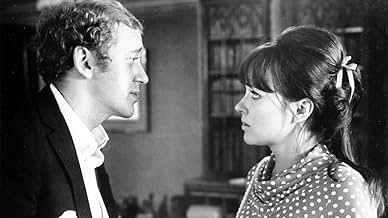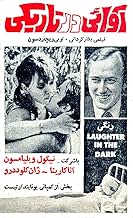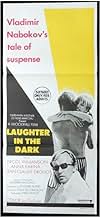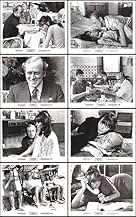IMDb-BEWERTUNG
6,1/10
258
IHRE BEWERTUNG
Füge eine Handlung in deiner Sprache hinzuA married middle-aged art critic and 16-year-old Margot begin an affair and develop a troublesome mutually parasitic relationship.A married middle-aged art critic and 16-year-old Margot begin an affair and develop a troublesome mutually parasitic relationship.A married middle-aged art critic and 16-year-old Margot begin an affair and develop a troublesome mutually parasitic relationship.
- Regie
- Drehbuch
- Hauptbesetzung
- Auszeichnungen
- 1 wins total
Richard Burton
- Sir Edward More
- (Gelöschte Szenen)
Empfohlene Bewertungen
Like a lot of movies that attain a certain fascination because they've become so hard to see (this got a very brief initial release, then was never released to home formats), Tony Richardson's film of the Nabokov novel is of course interesting as a bucket-list curiosity. But it's not actually very good. Swtiching the setting from the novel's mid-30s Germany to modern England blunts the original social commentary, and helps turn this from a misanthropically cruel, ironical comedy into a not very interesting story of a man who falls for a venal pretty girl, and is then ruined by her and her secret lover. That plot is basically unchanged from the novel, but there's nothing sophisticated or ambiguous about its telling anymore.
Nicol Williamson (who replaced Richard Burton after filming started, because Burton kept showing up late and drunk) is too young for his role, Anna Karina too old, but even if you throw out the novel's character conceptions (in which the female protagonist's shameless amorality seemed linked to her extreme youth) , these actors don't create interesting new ones. (Williamson at least gives a hardworking, serious performance; Karina is out of her element working in English, and isn't handled in a fashion to get by on charisma alone in a role you'd love to have seen Louise Brooks circa 1930 do.)
Jean-Claude Drouot is generically handsome and wooden as the lover, like an actor who'd have been cast as the lead in a cheap Europudding James Bond knockoff at the time--providing little to fill out a character whose actions turn from the merely mercenary to the flabbergastingly perverse. There's the required "Swinging London" nightclub scene with a band (I haven't been able to figure out who they are) and "psychedelic" effects. But otherwise the film seems rather divorced from its own time as well as the one it was originally set in.
This isn't a truly bad movie, but there's neither real conviction or wit to it, so the story is ultimately meaningless--these people mean nothing to us, nor do they illustrate any larger ideas. Like the very different and almost equally hard-to-see "King, Queen, Knave" a couple years later, this is a Nabokov adaptation that pretty much misses entirely the tone and value of the source material, and doesn't come up with anything worthy to replace it.
Nicol Williamson (who replaced Richard Burton after filming started, because Burton kept showing up late and drunk) is too young for his role, Anna Karina too old, but even if you throw out the novel's character conceptions (in which the female protagonist's shameless amorality seemed linked to her extreme youth) , these actors don't create interesting new ones. (Williamson at least gives a hardworking, serious performance; Karina is out of her element working in English, and isn't handled in a fashion to get by on charisma alone in a role you'd love to have seen Louise Brooks circa 1930 do.)
Jean-Claude Drouot is generically handsome and wooden as the lover, like an actor who'd have been cast as the lead in a cheap Europudding James Bond knockoff at the time--providing little to fill out a character whose actions turn from the merely mercenary to the flabbergastingly perverse. There's the required "Swinging London" nightclub scene with a band (I haven't been able to figure out who they are) and "psychedelic" effects. But otherwise the film seems rather divorced from its own time as well as the one it was originally set in.
This isn't a truly bad movie, but there's neither real conviction or wit to it, so the story is ultimately meaningless--these people mean nothing to us, nor do they illustrate any larger ideas. Like the very different and almost equally hard-to-see "King, Queen, Knave" a couple years later, this is a Nabokov adaptation that pretty much misses entirely the tone and value of the source material, and doesn't come up with anything worthy to replace it.
This extremely hard to find film is truly one of a kind. Sure it is difficult viewing as was Inadmissible Evidence from the year before (1968) also starring the wonderful Nicol Williamson. But this is what makes both films so compelling: their ability to unsettle and unnerve the viewer in a way very few films I have seen can.
Nicol Williamson excels yet again as the man with everything brought down to nothing and the supporting cast is very strong and exceptionally well cast.
1969 was a very productive year for the Nicol Williamson/Tony Richardson partnership as their excellent version of Hamlet was also released that year.
All three films are strongly recommended to those who appreciate British cinema of the 1960s though Inadmissible Evidence and Laughter In The Dark are very hard to find having never been released on video or DVD to my knowledge.
Nicol Williamson excels yet again as the man with everything brought down to nothing and the supporting cast is very strong and exceptionally well cast.
1969 was a very productive year for the Nicol Williamson/Tony Richardson partnership as their excellent version of Hamlet was also released that year.
All three films are strongly recommended to those who appreciate British cinema of the 1960s though Inadmissible Evidence and Laughter In The Dark are very hard to find having never been released on video or DVD to my knowledge.
The appeal of this film is not its plausibility. Its psychology is interesting, but not appealing. I read the book long ago, and I must have originally seen the film circa 1970. Watching it last night, in a just about bearable format, was not an agreeable experience, and my tastes must have changed. I'm not surprised it apparently got binned, and is now so difficult to find. An unusually nasty sort of forerunner to Lolita, but considerably less convincing. Still, it somehow needs to be seen. In spite of its irrationality the performances are compelling. The direction is a little loose and poorly paced; it could have been tightened up. A privileged man at the self-destructive mercy of his libido. I'll read the book again.
No names, no pack drill, but some actors are typecast as posh, others are only good in working class roles. Nicol Williamson is as believable as upper middle class Sir Edward More as he was as a violent, self-destructive Irishman in The Bofors Gun. Not that this would have been beyond the talents of Anthony Hopkins or the originally cast Sir Edward, Richard Burton, to name but two. Though would Burton's often worldly-wise screen persona have been quite right here?
Criticism from other reviewers and external commentators concern the liberties taken with Nabokov's novel, which I happily admit not to have read. Steven Puchalski (Shock Cinema, 2017) cavils that while the original Margo was only 16, "the film stars are only separated by four years". Well up to a point Lord Copper. In 1969 Williamson was 33 and Anna Karina 29, but he LOOKS an unfashionable 50, she LOOKS like a 20 year old gold digger. Is this not what acting is all about? An adolescent Margo would have made it too much like Lolita, making sympathy for Sir Edward more difficult.
Some also disapprove of the updating to a contemporary 1960's setting. Leaving it in 1930's Germany would probably have meant the intrusion of politics, a time consuming distraction from what is essentially an individual tragedy. And Anna Karina wouldn't have looked so good in 1930's garb as she does in bikinis and miniskirts. So what's not to like?
The movie version of Nabokov's pre-Lolita novel received mixed reviews when it was released in 1969. Among the movie's champions were Penelope Gilliatt of the New Yorker and Joseph Morgenstern, then writing for Newsweek. Richard Burton did not decline the male lead; he was fired at the start of the filming because of drunkeness. While his replacement, Nicol Williamson, was way too young for the part, Williamson gives an uncanny performance. He is matched by Anna Karina, who is excellent as the devious usherette who captivates him. This movie was one of her excursions into English-language cinema. "Laughter in the Dark" illustrates the phrase "Love is blind", both literally and figuratively. This movie should be made available on DVD and video, the better for movie lovers to admire its intelligence ,black humor and fine acting.
Wusstest du schon
- WissenswertesRichard Burton had been filming for two weeks when he was fired. Production company Woodfall Films in their press release said it was "for being unpunctual and unprofessional". However, it has been suggested that, whilst Burton had unarguably been difficult, Tony Richardson's real reason for firing him (at a time when he was the highest-paid, and perhaps most famous, film actor in the world) was to gain publicity, both for his film (which was, as expected, a major box-office failure) and himself. There have been other instances of someone very famous being fired from a film as a publicity tool or power play by producers - for example, producer David Merrick sacked Marlon Brando from the cast of "Child's Play", Merrick's first cinema production, soon after Brando's legendary success in "The Godfather", whilst another new producer, Martin Ransohoff, fired three-time Oscar-winning director William Wyler from "The Americanisation of Emily" to replace him with a newcomer from television, Arthur Hiller.
- VerbindungenReferenced in The Hitchhiker (2017)
Top-Auswahl
Melde dich zum Bewerten an und greife auf die Watchlist für personalisierte Empfehlungen zu.
- How long is Laughter in the Dark?Powered by Alexa
Details
- Erscheinungsdatum
- Herkunftsländer
- Sprache
- Auch bekannt als
- Laughter in the Dark
- Drehorte
- Produktionsfirmen
- Weitere beteiligte Unternehmen bei IMDbPro anzeigen
Zu dieser Seite beitragen
Bearbeitung vorschlagen oder fehlenden Inhalt hinzufügen


























